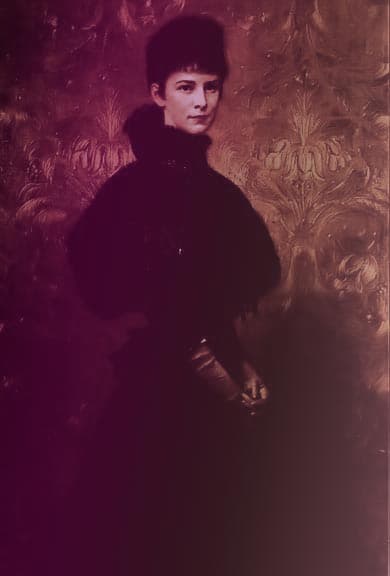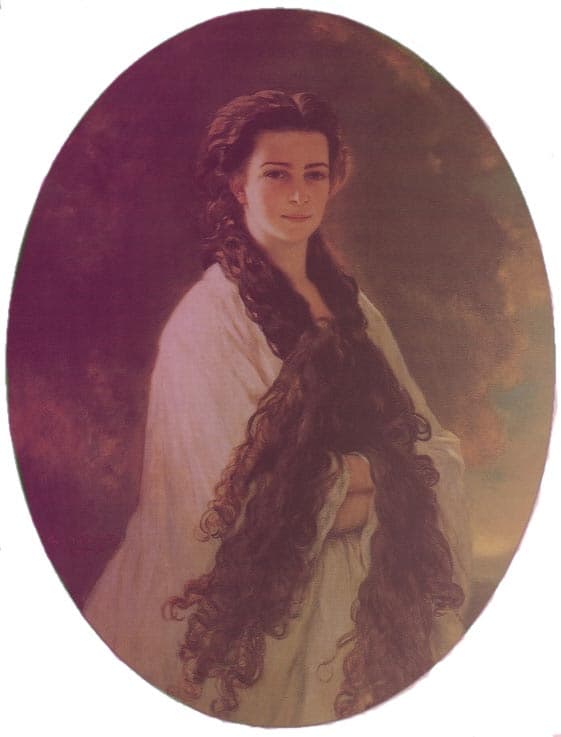Share this Post
To many people, Elisabeth of Austria was a free spirit – a woman longing for independence who chafed at the restrictions of court life in Vienna in the 19th century.
Wild and beautiful, they think of her roaming Europe in search of fulfillment on a physical and spiritual plane she just couldn’t reach with her courtiers, subjects, family, children, or husband. Me? I think she was kind of a bitch. Before I picked up The Lonely Empress by Joan Haslip (affiliate link), I thought poor Sisi was just misunderstood. Haslip disabused me of those notions pretty quickly. This is a good thing, though, because I saw a lot of myself in Elisabeth…and it scared the shit out of me.
Blueprint for Failure
I’ve written before about how I feel like a failure on a daily basis. Absolutely nothing has changed since I wrote this post in 2014. The Word doc with my to-do list is called “InjuryInducingToDoList.docx.” It was 9 single-spaced pages last time I opened it. I stopped opening it because all I did was cry. If Tom Hanks appeared and said, “There’s no crying in writing,” I’d cut him.
When I get home from work and look at the clock, I can’t find a way to make a dent in that list in just a few hours. So what’s the point? It’s too depressing to contemplate. Some nights, I just drink and binge-watch Orange Is the New Black on Netflix. Most of the time, I work on The Dante Deception until I can’t see straight and go to bed wondering if it’s like this for everyone who writes. No matter what I did the night before, I wake up feeling like a failure. I know I’m not writing enough, blogging enough, networking enough, or marketing enough. Other people out there are facing the same circumstances and not failing at this writing thing, which means there’s something wrong with me. I’m pretty sure I know what it is, but that’s a subject for a different post.
Enter Elisabeth of Austria
I have a hard time reading fiction when I’m editing one of my own books. I mostly read non-fiction when I’m super-deep in editing mode, like now. I picked up Joan Haslip’s The Lonely Empress since I’ve had it on my shelf for quite awhile. Our subject is Elisabeth Amalie Eugenie, Duchess in Bavaria, who was born into a cadet branch of the Wittelsbach family. Now, the Wittelsbachs are famous for one thing – complete raging insanity. They weren’t all insane, though, so you had to wait and see which ones went from mildly eccentric to flaming batshit crazy.
They weren’t all insane, though, so you had to wait and see which ones went from mildly eccentric to flaming batshit crazy.
Sometimes it wasn’t that bad. Elisabeth’s father, Max, liked hanging out with circus performers more than his own family. Relatively harmless, right? But sometimes the Wittelsbach genes went apocalyptic. Elisabeth’s cousin, Ludwig, bankrupted Bavaria to build Wagnerian castles until he was dethroned and imprisoned. Shortly afterward, he was found dead in the shallows of Lake Starnberg, the body of his doctor nearby. This is the genetic legacy handed down to Elisabeth through no fault of her own.

At first, it looked like she might take after her father and simply be eccentric. That’s how her five sisters turned out – shy, overly sensitive, and self-involved. Elisabeth was all these things, too, but it was tolerated because she was (a) a Wittelsbach, and (b) mind-bendingly beautiful, according to most people who saw her. Take a gander for yourself in the painting on the right.
At the age of 15, she was chosen by the emperor of Austria to be his bride. He was 23, and blinded by the beauty that she’d soon become famous for. They married when Elisabeth was only 16. These days, we call that statutory rape. I don’t blame her for having a hard time adjusting. When you were sixteen, could you have handled a husband? A domineering mother-in-law? A court stifled by etiquette that dictated your every move? It’s a lot to process for anyone, let alone someone whose natural tendency is to run away.
But instead of finding a way to cope, Elisabeth freaked out.
She threw tantrums and gave ultimatums to Franz Josef, her husband. She refused to appear at court events even though that was pretty much her only job. She hid from crowds because she hated being stared at, but then she got angry when people didn’t stare and fall under her spell. When her mother-in-law took charge of her kids’ upbringing and education, she ignored them instead of fighting for the right to be involved. Then she acted all passive-aggressive about her mother-in-law’s choices. It’s easier to complain than actually do something, so that was the game plan she stuck with.
And no one told her to grow the f*ck up. Not one person. Not ever.
So she didn’t. She ignored everything she didn’t like or understand, which included her children and husband. She ignored anything that caused her social anxiety, which included her court and her subjects. The things she couldn’t ignore she ran away from. She was absent from Vienna, her capital, more than she was ever there.
When she returned from trips to German spas or English hunting lodges or sunny Atlantic islands, she’d stay in Vienna for a week or two…and then get bitchy and angry when Franz Josef asked her to do anything useful, like attend a state dinner. She’d sulk and pout until she finally told her husband she just had to leave again. If he asked her to stay to spend time with him and the kids, she’d say things like, “But I’ll kill myself if I stay here because there’s nothing for me.” No one ever told her, “Fine. Go ahead. Kill yourself and see if I care.” I would have loved for Franz Josef to say that just to see the look on her face.
Somewhere along the line, she also developed what was probably an eating disorder.
Obsessed with being thin, she installed gymnastic equipment in her bedroom and exercised for hours on end. She ate nothing. Beef juice, milk, orange juice – as little solid food as possible. She weighed herself three times a day. If her eighteen-inch-waist grew more than a quarter-inch, she freaked out. If her 5’6″ frame weighed more than 110 pounds, she freaked out.
Sometimes she gets credit for having a modern mindset about appearance and exercise. The people who give her this credit probably don’t understand she had one or more mental illnesses driving her to make these decisions. I’m thinking in particular of this Diana Vreeland quote: “She was one of the first modern women. She was one of the first women who did exercises, one of the first who did gymnastics, and one night a week she’d go to bed in special sheets of bath toweling packed in beefsteaks — for her skin. Apparently, she never looked older than thirty — ever.”
“She was one of the first modern women. She was one of the first women who did exercises, one of the first who did gymnastics, and one night a week she’d go to bed in special sheets of bath toweling packed in beefsteaks — for her skin. Apparently, she never looked older than thirty — ever.”
Diana Vreeland
I’m shaking my head here. Diana Vreeland claimed Elisabeth was one of her heroes, so she must have known about Mayerling. She had to. What’s Mayerling, you ask? It’s the hunting lodge in which Elisabeth’s son and heir killed his teenage mistress and then himself in a murder-suicide pact. The details are hazy. No one knows exactly how it went down or why. What we do know is that Rudolf adored his mother and she pretty much ignored him for most of his life.
Even worse, she belittled (and ignored) Rudolf’s sixteen-year-old bride.
This is rich, considering the trouble she herself had adapting to marriage in a new country at a young age.
Did Elisabeth care?
Nope.
She made fun of Rudolf’s bride, Princess Stephanie, for being awkward and – wait for it – less beautiful than she herself. Women didn’t seem to matter to Elisabeth, with the exception of her mother and sisters. They were rivals for the male affection she devoured like a black hole.
Aside from a small handful of ladies-in-waiting, the only woman she seemed to like was an actress named Katharina Schratt, whom she openly encouraged Franz Josef to have an affair with so he’d stop pestering her in the bedroom. So, to recap, this woman wanted everyone in the world to fall in love with her, express undying admiration for her, but leave her the hell alone unless she needed something from them, in which case, they damn sure better come running.
It’s a good thing Elisabeth had her looks. Ask yourself if anyone would tolerate this behavior from an ugly woman.
Ask yourself if anyone would tolerate this behavior from an ugly woman.
Blueprint for Change
I couldn’t stop turning the pages in Haslip’s book. I wanted to see some glimmer of hope – a wake-up call. That’s what happens in movies, right? The selfish character gets in a car accident or blacks out while drinking and sees the error of her ways. But this was real life so it never happened. To me, Elisabeth grew more detestable over time. The worst part was that I kept seeing elements of her in myself:
- Like her, I hate being stared at. I don’t like to getting up and walking through public places because I imagine people are going to stare. I never think they’re staring because I’m awesome. I think they’re picking me apart. It does no good to tell me they aren’t. I know that. It doesn’t help.
- Like her, I hate making small talk. I avoid it at all costs. This means I don’t go to parties or social events.
- Like her, I hate official functions. They usually involve (a) being stared at, and (b) making small talk. This means I don’t go to meetings or conventions or ceremonies.
- Like her, I have a tendency to give up rather than compete for attention, friendship, or professional success. Not out of principle, but because I’m afraid to put myself on the line and lose. Giving up is much easier.
The more I read, the more scared I got.

I gripped the book in my sweaty hands and cussed at her. I wanted someone to slap her upside the head and tell her to get a grip. The frustrating thing was that she seemed capable of it at times. When heinous shit went down, she cleaned up her act. Hungary on the verge of revolution? She networked her ass off, made the Hungarians fall in love with her (the feeling was mutual), and played a vital role in keeping the empire together. War in Italy or Germany? She sucked it up and set up field hospitals in the palace, nursing soldiers herself, no matter how contagious their illnesses or gory the wounds. I’m not saying she was all bad, far from it. Look at this painting of her – I chose this one because, to me, it’s one of the warmest. Her face is fuller, softer, rounder, and more friendly looking than in some of her other portraits. She doesn’t look like the half-crazy woman from the pages of Haslip’s book. This portrait makes me want to root for her.
But when the element of danger faded away, her resolve usually faded, too.
She’d start doing selfish things all over again. She refused to go to her mother’s funeral because traveling from Austria to Bavaria was too stressful. She refused to reach out to a suicidal son who clearly yearned for her attention. Violence is not the answer, but if this woman had stood before me as I read about the way she ignored her children, pushed away her husband, and made life miserable for her courtiers and servants, I would have clocked her to make her feel something other than self-pity.
Then I imagined people feeling the same way about me. What if they wanted to clock me for feeling so mopey and put-upon?
Elisabeth let her looks and her anxiety rule her life.
Was I letting my writing and my anxiety rule mine? It was a sobering and horrifying thought. The more I thought about it, I realized the answer was yes. I can’t stop wanting to write or to make money through writing. I can stop feeling put upon and blaming other people or things for my shortcomings. Thanks to Elisabeth’s example, I’m trying to get a grip.
Haslip’s biography ended abruptly, the minute after someone told Franz Josef she’d been killed. I think Haslip was sick of Elisabeth. I wanted to know how people reacted to her death, though, and I wish Haslip had choked down the bile for a few more pages at least and given me some idea of Sisi’s legacy. I’m not the only one who has trouble reconciling the misunderstood free spirit with the selfish and neglectful wife and mother. This Jezebel article explores that dichotomy pretty well.
I’m not the only one who has trouble reconciling the misunderstood free spirit with the selfish and neglectful wife and mother.
If you google Elisabeth of Austria on YouTube, you’ll find hundreds of tribute videos to her. People love her. I know why, but I can’t share in the adulation. I’m not sure Rudolf could have been saved, but I believe she bears a share of the guilt. Beauty isn’t a reason to celebrate someone who hurts other people. Doing what the job requires of you only when push comes to shove is not a reason to celebrate someone. It’s what we should all do – and many do more. They’re the ones we should be celebrating.
In the meantime, I’m trying to be a little kinder to myself, be kinder to others, and not get choked out by my own to-do list.
Want to read the same book I read?

About the Author
I write non-fiction, fiction, and run the YouTube Channel The Girl in the Tiara. My first non-fiction book, The Hunt for Anna Pavlovna’s Stolen Jewels, will be published by Pen and Sword History in 2026. To keep in touch, sign up for my royal history newsletter here.

Love Royalty and Tiaras?
You might like my other site, The Girl in the Tiara. I created it to write about amazing royal women and their tiaras. It’s like Drunk History meets The Crown.
Image Credits
Header Image background: Portrait of Queen Elizabeth by Gyula Benczúr, Public domain, via Wikimedia Commons
Oval portrait: Empress Elisabeth of Austria, Franz Xaver Winterhalter, Public domain, via Wikimedia Commons
Affiliate Links
I’m a participant in the Amazon Services LLC Associates Program, an affiliate advertising program designed to provide a means for sites to earn advertising fees by advertising and linking to Amazon.com. As an Amazon Associate I earn from qualifying purchases. The links to Haslip’s book are my Amazon affiliate links. If you choose to buy the book through this link, I’ll earn a few extra cents.
Tell the World
